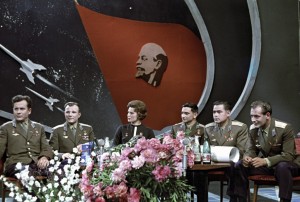There’s a general view that science fiction is a literature of reaction. Michael Moorcock, tracing the pulp origins of its so-called “golden age” mocks the notion that it’s a literature of ideas in his Starship Stormtroopers–titled after Heinlein’s Starship Troopers, a novel which does, sadly, make a strong case for his position.
Not all science fiction has a reactionary message though. As this list of science fiction for socialists shows, there’s a great deal to read about the future without falling victim to the typical tropes of the expansion of the frontier and manifest destiny–now in space.
Science fiction has the advantage as a literature for socialism that it looks towards the future. While mainstream literature attempts to analyse the varying nature of humans in the every day world we all know, and too much change would distract from this task, SF speaks to us of the dialectic between science, technology, society, and the individual: it feeds on change. This is why it’s possible to explore socialism–as well as other radical social changes–in a way that’s unavailable to other genres.
More than the particular worlds science fiction explores, though, it’s perhaps most interesting because it shows us something which is often overlooked: another world is possible; things change. The conditions of life of today weren’t those of yesterday and won’t be those of tomorrow.
Some people have called SF the “literary apparat of the technocratic movement”, and they do have a point. There’s a strong strand of science fiction which presents society as a machine which needs to be run by those who properly understand it. That’s not a fault of the parameters of the genre, though, but just the fact that the same freedom which allows us to speculate about socialism allows others to speculate about other things.
I’ll present a few of my favourite socialist SF and a short description. Let us know what yours is on the comments.
The Culture, by Iain Banks. This is a collection of novels focused on a social formation which calls itself the Culture. They have dealt with scarcity, and their production systems are largely managed by benevolent and powerful AIs called Minds. However, to give their lives meaning, they feel they ought to do something more than just enjoy themselves, so they try to improve other societies through interventions which are statistically demonstrated to lead to higher utility.
Accelerando, by Charles Stross. A novel dealing with the Singularity, it presents the difficulties entailed by the transition to post-scarcity, and the participation in the economy of super-human intelligences, which may stand as a metaphor for corporations.
Most of the works by Harry Harrison, particularly the Stainless Steel Rat series. Harry Harrison presents dynamic worlds, changing societies, and even looks at ethics as something socially determined and constructed. His Deathworld series is another case where this tendency is particularly distinct, and refreshing.
Ken MacLeod’s entire bibliography. As an ex-trotskyist, now ensnared by the siren songs of mutualism, much of his work treats the socialist hypothesis very seriously.
Ursula K LeGuin’s The Dispossessed. Just read it.
Voyage from Yesteryear, by James P. Hogan. Given the risks of nuclear war, a space ship is sent to another planet to preserve humanity, but there’s not enough energy to send adults: only embryos can be sent. The children are rissen by AIs, and they create a unique society for themselves, which is put at risk when further ships from Earth are sent, this time with the object of colonisation.
Last, and just for the sake of completeness, Robert Heinlein’s Beyond this Horizon is a strange exploration of a world with eugenics, but also some kind of quasi-socialist, or at least semi-planned economy, based on principles that sounds slightly similar to those of social credit. For the incredulous, I quote a paragraph:
Monroe-Alpha shook his head. “Finance structure is a general theory and applies equally to any type of state. A complete socialism would have as much need for structural appropriateness in its cost accounting as do free entrepreneurs. The degree of public ownership as compared with the degree of free enterprise is a cultural matter. For example, food is, of course, free, but–“
What’s your favourite socialis science fiction? Are there other genres you think present socialism’s message better? What other SF not explicitly socialist do you like?












6 Responses to Reds in space: socialist science fiction